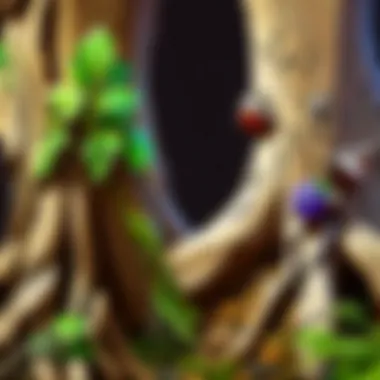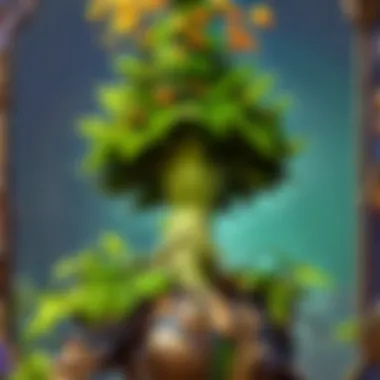Unveiling the Intriguing World of Plantart: A Detailed Exploration


Game Updates and Patches
Plantart enthusiasts eagerly anticipate the latest updates and patches, akin to players of a strategic card game seeking an edge in gameplay dynamics. These updates present a shift in the landscape of Plantart cultivation, introducing novel features and mechanics that spur discussions and strategic adaptations among cultivators. The detailed breakdown of changes elucidates the nuanced impact on Plantart growth and harvesting techniques, analogous to dissecting the implications of new card mechanics on gameplay strategies in Hearthstone.
During each update, enthusiasts delve into the analysis of recently introduced cards and proposed techniques to optimize cultivation practices. This analytical approach mirrors the scrutiny of new cards and gameplay mechanics in Hearthstone, where players assess the value and potential synergies to craft efficient strategies. The comparative study of Plantart updates with Hearthstone patches yields intriguing parallels in the strategic decision-making process and adaptive flexibility required in both domains,
Deck Strategies and Meta Analysis
Amidst the captivating world of Plantart lies a nuanced strategy akin to planning deck constructions in Hearthstone. Cultivators engage in crafting diversified approaches, tailoring strategies to different growth styles and environmental factors. Just as Hearthstone players select decks based on play styles and competitive aspirations, plant enthusiasts diversify their cultivation methodologies to maximize yield and resilience against adverse conditions. The meta-analysis of prevailing growth patterns and popular plant archetypes draws striking resemblances to dissecting dominant deck archetypes and tech considerations in Hearthstone's competitive landscape.
Strategies for countering prevalent growth patterns and ecotone choices align closely with the tactical viewpoints shaped by countering dominating decks and selecting tech cards in Hearthstone matches. The thematic crossover between plant cultivation strategies and deck contrivances underscores the significance of adaptability and strategic foresight prevailing in both domains. By merging insights from Plantart cultivation techniques with Hearthstone gameplay tactics, cultivators and players alike can deepen their understanding of dynamic strategies in distinct but interconnected realms,
Card Reviews and Set Reviews
In the intricate realm of Plantart, a parallel can be drawn to card reviews in the world of Hearthstone, where the unveiling of novel cards prompts intense scrutiny and evaluation. Cultivators meticulously review the features of new Plantart strains, analyzing their growth patterns, resilience, and adaptability to diverse soil compositions. The evaluations of potential synergies between various Plantart strains mirror the evaluations of card interactions within different deck archetypes in Hearthstone.
Set reviews in Plantart, focusing on the value, versatility, and competitive efficacy of distinct plant varieties, offer cultivators strategic insights akin to evaluating the competitive viability and situational potency of card sets in Hearthstone. This comparative analysis draws upon the principles of strategic evaluation and fine-tuned decision-making found in both Plantart cultivation and competitive card gaming. By delving into the detailed card and set reviews across Plantart and Hearthstone, enthusiasts gain a holistic perspective on strategic considerations and evolutionary trends prevalent in both arenas,
Player Guides and Tips
As novices navigate the enigmatic landscape of Plantart cultivation, akin to beginners entering the world of Hearthstone, comprehensive player guides serve as beacons of elucidation. Beginner's guides demystify core growth mechanics and strategies essential for fostering healthy Plantart, resonating with Hearthstone tutorials that elucidate fundamental gameplay mechanics and strategic nuances. Additionally, advanced tips curated for enhancing gameplay proficiency and decision-making resonates with the strategic depth and analytical prowess demanded in competitive Hearthstone matches.
Arena drafting strategies and genre-specific gameplay tips offer cultivators and players valuable insights into optimizing their approaches for favorable outcomes. The harmonized exploration of strategic nuances and tactical considerations between Plantart cultivation and Hearthstone gameplay amplifies the intellectual engagement and analytical acumen required in mastering the intricacies of both endeavors. By intertwining Player Guides and Tips in Plantart with their Hearthstone counterparts, cultivators and players embark on a journey of growth, learning, and strategic finesse across two distinct yet thematically similar terrains,
Introduction to Plantart
Plantart, a mysterious entity in the botanical world, holds a plethora of secrets waiting to be unveiled. This article serves as a guide to comprehend the intricate details surrounding Plantart, shedding light on its origins, characteristics, cultivation methods, and potential benefits. By delving into the science behind Plantart and its significance in modern agriculture, readers will embark on a journey of exploration and discovery.
Understanding Plantart
The Concept of Plantart
Plantart captivates scholars and enthusiasts alike with its unique concept. It represents a fusion of art and botanical elements, creating a harmonious blend that appeals to the senses. The key characteristic of The Concept of Plantart lies in its ability to evoke emotions and connections with nature. This aspect makes it a popular choice for exploration within this article, as it showcases the beauty and creativity intertwined in Plantart. The unique feature of The Concept of Plantart is its seamless integration of artistic expression with natural elements, offering a fresh perspective on traditional botanical studies.
Evolution of Plantart Studies
The Evolution of Plantart Studies marks a significant progression in botanical research and creativity. It traces the development of Plantart from its inception to the present day, highlighting the evolution of techniques and styles. This aspect contributes to the overall goal of understanding Plantart by providing insights into its growth and adaptation over time. The key characteristic of Evolution of Plantart Studies is its adaptability and innovation, making it a beneficial choice for exploration in this article. The unique feature of Evolution of Plantart Studies is its ability to inspire new approaches and interpretations in botanical artistry.


Significance of Plantart
Impact on Environmental Sustainability
Plantart plays a pivotal role in promoting environmental sustainability through its innovative practices. Its impact on Environmental Sustainability is profound, as it showcases how art and nature can coexist harmoniously. The key characteristic of Impact on Environmental Sustainability is its ability to raise awareness and foster eco-conscious behaviors. This aspect makes it a valuable choice for discussion in this article, emphasizing the importance of conservation and sustainability efforts. The unique feature of Impact on Environmental Sustainability is its potential to inspire positive change and mitigate environmental challenges.
Potential Applications in Agriculture
The Potential Applications in Agriculture demonstrate the practical implications of Plantart in enhancing agricultural practices. Its relevance lies in offering creative solutions to agricultural challenges and promoting sustainable farming methods. The key characteristic of Potential Applications in Agriculture is its capacity to improve yields and efficiency in crop production. This aspect makes it a valuable choice for examination in this article, highlighting the intersection of artistry and functionality in agricultural contexts. The unique feature of Potential Applications in Agriculture is its potential to revolutionize farming techniques and contribute to food security initiatives.
Historical Roots of Plantart
Ancient References to Plantart
Ancient References to Plantart unveil the historical significance of combining art and nature in creative expressions. These references offer insights into early artistic practices intertwined with botanical elements, showcasing humanity's enduring fascination with the natural world. The key characteristic of Ancient References to Plantart is their cultural relevance and artistic representations, making them a valuable choice for exploration in this article. The unique feature of Ancient References to Plantart is their ability to transcend time and resonate with contemporary artistic sensibilities.
Revival of Interest in Modern Times
The Revival of Interest in Modern Times signals a resurgence of appreciation for Plantart in today's society. It reflects a renewed enthusiasm for botanical artistry and environmental consciousness, highlighting the enduring appeal of integrating art and nature. The key characteristic of Revival of Interest in Modern Times is its reflection of current cultural trends and values, contributing to a deeper understanding of Plantart's contemporary significance. The unique feature of Revival of Interest in Modern Times is its capacity to inspire new generations to explore the beauty and complexity of botanical expressions in the modern era.
Characteristics of Plantart
In this section, we will delve into the vital topic of the characteristics of Plantart. Understanding the specific elements and benefits of these characteristics is crucial in gaining a comprehensive insight into this intriguing botanical phenomenon.
Biological Aspects
Unique Morphological Features
When it comes to unique morphological features of Plantart, one cannot overlook the intricate patterns and structures that set it apart from other plant species. The key characteristic lies in the way Plantart displays a symbiotic relationship between its roots, stems, and leaves, allowing for efficient nutrient uptake and distribution. This feature not only enhances the plant's adaptability to diverse environments but also contributes to its aesthetic appeal. Despite some challenges in cultivation, the unique morphological features of Plantart remain a popular choice for researchers and enthusiasts exploring its beauty and functionality.
Adaptation Mechanisms
The adaptation mechanisms employed by Plantart further illustrate its resilience and survival strategies in various habitats. By adapting its growth patterns, reproductive strategies, and physiological processes, Plantart can thrive in harsh conditions and changing climates. One of the key characteristics of these adaptation mechanisms is the plant's ability to adjust its metabolism based on environmental cues, ensuring optimal growth and development. While these mechanisms come with certain limitations, such as susceptibility to specific diseases, they remain a favored choice for our exploration in this article.
Genetic Composition
Genetic Diversity in Plantart Species


The genetic diversity found in Plantart species plays a significant role in shaping their characteristics and behavior. By harboring a wide range of genetic traits and variations, Plantart exhibits resilience to external stressors and environmental changes. The key characteristic of this genetic diversity lies in its potential to drive evolution and adaptation within the species, fostering biodiversity and genetic innovation. Despite some challenges in maintaining genetic stability, the genetic diversity in Plantart species continues to be a compelling subject for research and conservation efforts.
Genetic Manipulation Techniques
Genetic manipulation techniques have revolutionized the way we study and modify Plantart species for various purposes. By leveraging tools like gene editing and recombinant DNA technology, researchers can tailor the genetic makeup of Plantart to enhance desirable traits and characteristics. The key characteristic of these manipulation techniques is their precision and efficiency in targeting specific genes for modification, leading to accelerated developments in plant breeding and genetic engineering. Although ethical concerns and regulatory frameworks pose some limitations, genetic manipulation techniques offer immense potential for advancing our understanding and utilization of Plantart.
Physiological Functions
Photosynthetic Pathways in Plantart
The photosynthetic pathways employed by Plantart play a fundamental role in its energy production and growth processes. By harnessing light energy and converting it into chemical energy, Plantart sustains its metabolic functions and promotes overall health. The key characteristic of these pathways is the plant's ability to optimize photosynthetic efficiency under varying light conditions, ensuring continuous nutrient synthesis and biomass accumulation. Despite some trade-offs in resource allocation and energy expenditure, the photosynthetic pathways in Plantart remain a fundamental focus of research and cultivation practices.
Nutrient Uptake and Distribution
Efficient nutrient uptake and distribution are vital aspects of Plantart's physiological functions, influencing its growth, development, and resilience. By utilizing specialized transport systems and root structures, Plantart effectively absorbs essential nutrients from the soil and distributes them throughout its tissues. The key characteristic of this process is the plant's ability to regulate nutrient uptake based on demand and environmental cues, optimizing resource utilization and metabolic activities. Despite challenges related to nutrient imbalances and overaccumulation, the nutrient uptake and distribution mechanisms in Plantart hold significant relevance for agricultural practices and sustainability initiatives.
Cultivation Methods
Plantart cultivation methods play a crucial role in this insightful guide, offering intricate details on how to grow and nurture these botanical wonders. Delving into the specifics of cultivating Plantart is essential for those looking to understand the nuances of this unique botanical realm. By shining a light on cultivation methods, readers will gain a deeper appreciation for the complexity and beauty of Plantart.
Optimal Growing Conditions
Light and Temperature Requirements
Exploring the critical elements of light and temperature requirements sheds light on the ideal conditions for fostering Plantart growth. Understanding the interplay between light exposure and temperature variations is key to maximizing the health and vitality of Plantart specimens. By delineating the essential characteristics of light and temperature requirements, enthusiasts can create a conducive environment for their Plantart to thrive. The unique features of these requirements dictate the success and sustainability of Plantart cultivation, showcasing their significance in this comprehensive guide.
Soil and Water Preferences
Diving deep into the specifics of soil and water preferences unravels the intricacies of providing the optimum growing medium for Plantart. Highlighting key characteristics of preferred soil compositions and water quality illuminates the importance of these factors in nurturing healthy Plantart. By detailing the advantages and disadvantages of various soil and water preferences, readers can make informed decisions regarding the cultivation of Plantart. Understanding the nuances of these preferences is essential for maintaining the vitality and resilience of Plantart species.
Propagation Techniques
Seed Propagation
Examining the intricacies of seed propagation unveils the art and science of reproducing Plantart through seeds. Shedding light on the key characteristics and benefits of seed propagation underscores its value in expanding the population of Plantart specimens. By elucidating the unique features and considerations of seed propagation, enthusiasts can delve into the fascinating world of generative plant reproduction. Understanding the advantages and disadvantages of seed propagation is essential for cultivating a diverse and resilient community of Plantart.
Vegetative Reproduction


Exploring the realm of vegetative reproduction elucidates the alternative methods of expanding and propagating Plantart beyond seeds. Highlighting the distinctive characteristics and advantages of vegetative reproduction showcases its role in diversifying and preserving Plantart genetic diversity. By delving into the unique features and considerations of vegetative reproduction, readers can appreciate the versatility and adaptability of Plantart propagation techniques. Understanding the nuances of vegetative reproduction is crucial for ensuring the sustainability and evolution of Plantart species.
Maintenance Practices
Pruning and Trimming
Unpacking the principles of pruning and trimming unveils the meticulous techniques involved in maintaining the shape and health of Plantart specimens. Highlighting the key characteristics and benefits of pruning and trimming emphasizes their importance in sculpting and rejuvenating Plantart growth. By describing the unique features and challenges of pruning and trimming, enthusiasts can master the art of shaping and revitalizing their Plantart collection. Understanding the advantages and disadvantages of pruning and trimming is essential for cultivating thriving and visually appealing Plantart displays.
Fertilization Strategies
Analyzing the strategies for fertilizing Plantart delves into the crucial practices of providing essential nutrients for optimal growth and development. Highlighting the key characteristics and benefits of specific fertilization techniques underscores their significance in enhancing the vitality and resilience of Plantart specimens. By delineating the unique features and considerations of fertilization strategies, readers can adopt tailored approaches to nourishing their Plantart collection. Understanding the advantages and disadvantages of various fertilization strategies is vital for promoting the flourishing and longevity of Plantart species.
Potential Benefits of Plantart
Plantart offers a myriad of potential benefits that are crucial to understanding its significance in modern contexts. An in-depth analysis of Plantart's contribution to environmental sustainability and its potential applications in agriculture sheds light on its practical implications. By exploring the impact of Plantart on carbon sequestration and biodiversity conservation, we unravel the intricate web of ecological benefits it provides. Moreover, delving into Plantart's therapeutic properties and air purification abilities uncovers its potential role in enhancing health and wellness. From commercial applications to market trends and demand, Plantart's economic value is a key aspect to consider for various industries.
Environmental Impact
Carbon Sequestration
Carbon sequestration plays a vital role in mitigating climate change by capturing and storing carbon dioxide from the atmosphere. This process not only helps in reducing greenhouse gas emissions but also contributes to enhancing air quality. The unique feature of carbon sequestration lies in its ability to sequester carbon for extended periods, thereby reducing the overall carbon footprint. Understanding the advantages and disadvantages of carbon sequestration in the context of Plantart helps us appreciate its significance in promoting environmental sustainability.
Biodiversity Conservation
Biodiversity conservation, a cornerstone of sustainable ecosystems, is another key aspect influenced by Plantart. By preserving a wide range of plant species and habitats, Plantart encourages biodiversity, which is essential for the overall health of the ecosystem. The unique feature of biodiversity conservation lies in its ability to maintain a balanced ecosystem and protect endangered species. Examining the advantages and disadvantages of biodiversity conservation within the realm of Plantart offers a holistic perspective on its environmental impact.
Health and Wellness
Therapeutic Properties of Plantart
Plantart's therapeutic properties encompass a diverse range of benefits, including anti-inflammatory, antioxidant, and antimicrobial properties that contribute to overall well-being. These properties make Plantart a popular choice for natural remedies and holistic health practices, emphasizing its role in promoting health and wellness. Exploring the unique features of Plantart's therapeutic properties allows us to understand its potential applications in traditional and alternative medicine.
Air Purification Abilities
Plantart's air purification abilities are crucial for improving air quality by filtering out toxins and pollutants present in the environment. This exceptional feature enhances air circulation, reduces indoor pollution, and promotes a healthier living environment. Understanding the advantages and disadvantages of Plantart's air purification abilities provides insights into its significant role in maintaining clean and breathable air.
Economic Value
Commercial Applications of Plantart
The commercial applications of Plantart are diverse, ranging from pharmaceuticals and cosmetics to food and beverage industries. Its versatile nature and adaptability make it a valuable resource for various products and services. The unique feature of Plantart's commercial applications lies in its potential for innovation and market expansion. Analyzing the advantages and disadvantages of using Plantart for commercial purposes offers a glimpse into its economic viability and market potential.
Market Trends and Demand
Analyzing market trends and demand for Plantart products reveals valuable insights into consumer preferences and industry shifts. Understanding the key characteristics that drive market trends and demand is essential for adapting strategies and meeting consumer needs. The unique feature of market trends and demand in relation to Plantart lies in its ability to influence product development and market positioning. Assessing the advantages and disadvantages of responding to market trends and demand enhances decision-making and strategic planning in various sectors.







